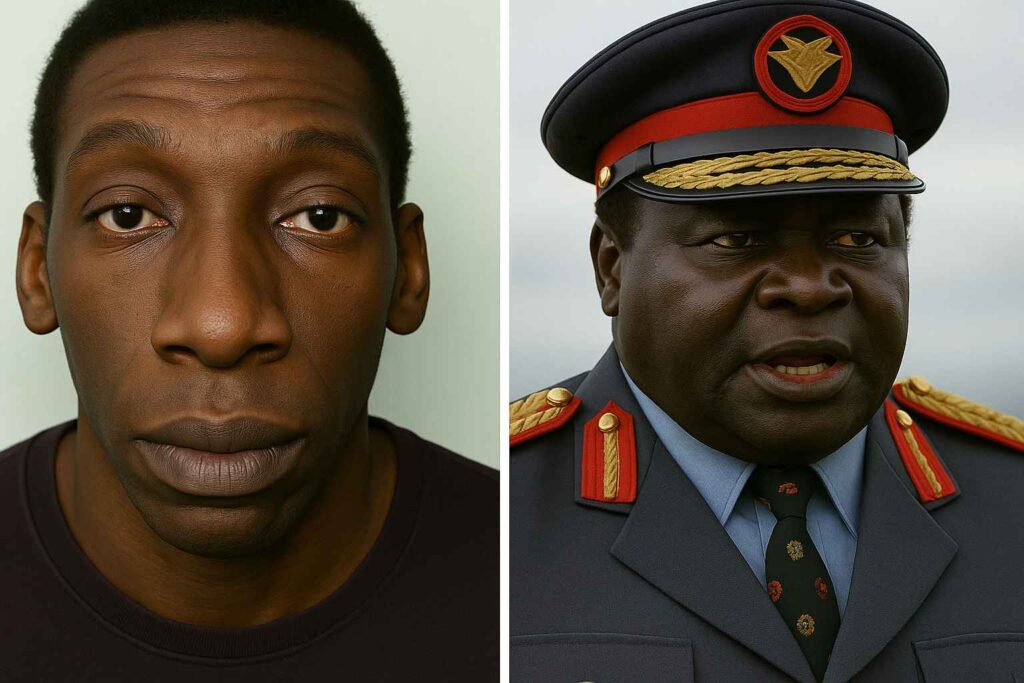Faisal Wangita, the youngest known son of Uganda’s former dictator Idi Amin, has lived a life marked by his father’s infamous legacy and personal struggles. Born in 1981 in Saudi Arabia during his family’s exile, Faisal grew up far from Uganda, only to face crime, imprisonment, and deportation after a violent incident in London. Now back in Uganda, his story sheds light on the challenges faced by the children of controversial leaders.
Faisal was born to Sarah Kyolaba, Idi Amin’s fifth wife, a former dancer in the Ugandan army’s band nicknamed “Suicide Sarah.” Sarah married Amin in 1975 in a lavish ceremony attended by figures like Yasser Arafat, who served as best man. After Amin’s brutal regime, which saw an estimated 100,000 to 500,000 deaths, was overthrown in 1979, the family fled to Libya and then Saudi Arabia. In 1982, Sarah left Amin, taking Faisal to Germany, where she worked as a model, before settling in London.
Life in London was tough for Faisal. By his early twenties, he joined the North London Somalis, a violent gang, despite not being Somali. On January 28, 2006, Faisal was part of a 40-strong gang that attacked 18-year-old Mahir Osman in Camden Market. Osman, a rival gang member, was stabbed 21 times and beaten with knives, hammers, and poles, dying later that day. CCTV footage showed Faisal kicking Osman during the attack.
In 2007, a London court acquitted Faisal of murder but found him guilty of conspiracy to wound, conspiracy to possess an offensive weapon, and violent disorder. He was sentenced to five years in prison. The court noted he posed a “serious risk to the public.” To avoid bias, his connection to Idi Amin was kept secret during the trial. In 2010, just before his scheduled deportation, Faisal was involved in another violent incident at Colnbrook Detention Centre, where he and others allegedly beat a fellow detainee. He faced charges of grievous bodily harm and false imprisonment but was deported to Uganda around 2012 after serving his sentence.
Sarah Kyolaba, meanwhile, worked hard to support Faisal in London. She ran a small African restaurant and later worked as a hairdresser in Tottenham. Sarah died in 2015 at 59 from cancer, leaving behind a legacy of resilience. Her modest life contrasted with her past as Amin’s “favorite” wife.
Little is known about Faisal’s life in Uganda since his return. The lack of public information suggests he may be living quietly, avoiding attention due to his father’s notoriety and his own criminal past. Idi Amin’s legacy remains divisive in Uganda, with some in West Nile viewing him as a patriot, while others remember him as a tyrant responsible for mass killings and the 1972 expulsion of Asians that crippled the economy.
Faisal’s story highlights the burden carried by children of infamous figures. Growing up in exile, disconnected from Uganda, likely contributed to his troubled path. Unlike his brother Jaffar Amin, who has pursued reconciliation to address their father’s atrocities, Faisal has been defined by his criminal actions. His life raises questions about identity and the long-term impact of a parent’s legacy.

